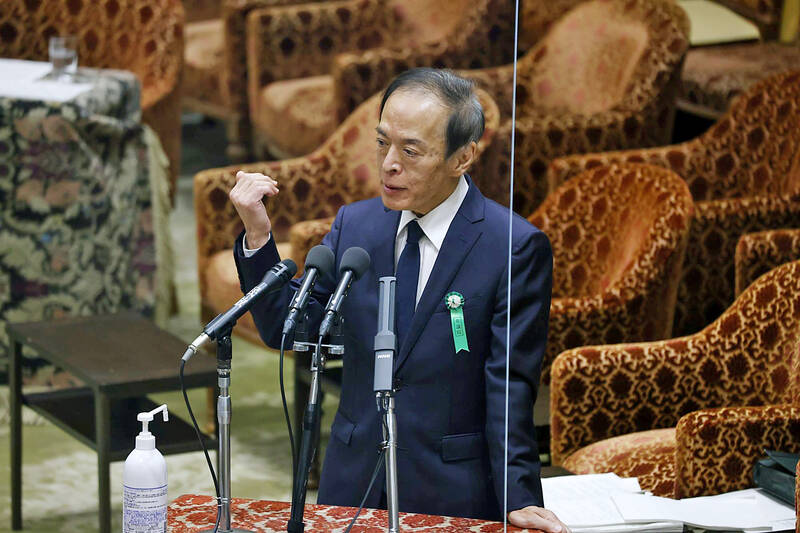Consumer prices in Japan jumped last month by the most in more than 41 years, the Japanese government reported yesterday, adding to pressure on the central bank to adjust its longstanding ultra-lax monetary policy.
The key price indicator, which excludes volatile fresh foods, rose 4.2 percent last month, but some analysts expected it to be slightly higher.
Excluding energy prices, inflation rose at a 3.2 percent annual rate.

Photo: Bloomberg
That news came as the nominee to become governor of the Bank of Japan (BOJ), Kazuo Ueda, told lawmakers that the central bank’s strategy was “appropriate,” and that its near-zero benchmark interest rate should continue “to solidly support the economy.”
Ueda is expected to succeed BOJ Governor Haruhiko Kuroda, who engineered the policy, when his second five-year term ends in April. The nomination requires parliamentary approval.
The BOJ’s monetary policy was designed to fight off deflation, and Japan’s inflation rate has stayed relatively low compared with the US and Europe.
“Time is needed before the effects of monetary policy kick in,” Ueda told the Japanese parliament, adding that the price rises are peaking.
The change of leadership at the central bank has drawn global attention, with speculation that Ueda might unwind the monetary easing that Kuroda installed almost a decade ago.
However, he countered such expectations, saying that the policy stance is needed to achieve stable consumer prices and rising wages.
He also stressed that the BOJ was cooperating closely with central banks around the world and international monetary officials.
Ueda was previously a BOJ policy board member, but has a mostly academic background. He would need to maneuver through challenging times.
Although overall inflation in Japan remains subdued, surging prices for oil, gas and other commodities have fed into prices for many consumer goods, utility rates and other costs.
The last time the core consumer price index rose as much as last month was in September 1981, the Statistics Bureau of Japan said.
At the time, oil prices had soared in the late 1970s in what was dubbed the “oil shock.”
Under Kuroda, the central bank set a target price rise of 2 percent, but prices have risen at a faster pace in recent months. Manufacturers and food outlets have been announcing price rises, one after the other.
More time is needed to see that price increases are stable, Ueda said.
The change of BOJ leadership could signal a shift from the “Abenomics” economic policies of late Japanese prime minister Shinzo Abe, economics analyst Haruhiko Sato said.
“The markets are feeling a trifle unsettled in anticipation of a shift in policy, even if it were to come gradually,” he said in a recent report.
Wage increases generally have not kept pace with inflation, adding to hardships for some households at a time when the Japanese yen has weakened against the US dollar and other currencies. That boosts the purchasing prices of imports, including energy and food.
Japan avoided slipping into recession late last year, eking out a 0.6 percent annual pace of growth from October to December, following a contraction in the previous quarter.

SEEKING CLARITY: Washington should not adopt measures that create uncertainties for ‘existing semiconductor investments,’ TSMC said referring to its US$165 billion in the US Taiwan Semiconductor Manufacturing Co (TSMC, 台積電) told the US that any future tariffs on Taiwanese semiconductors could reduce demand for chips and derail its pledge to increase its investment in Arizona. “New import restrictions could jeopardize current US leadership in the competitive technology industry and create uncertainties for many committed semiconductor capital projects in the US, including TSMC Arizona’s significant investment plan in Phoenix,” the chipmaker wrote in a letter to the US Department of Commerce. TSMC issued the warning in response to a solicitation for comments by the department on a possible tariff on semiconductor imports by US President Donald Trump’s

‘FAILED EXPORT CONTROLS’: Jensen Huang said that Washington should maximize the speed of AI diffusion, because not doing so would give competitors an advantage Nvidia Corp cofounder and chief executive officer Jensen Huang (黃仁勳) yesterday criticized the US government’s restrictions on exports of artificial intelligence (AI) chips to China, saying that the policy was a failure and would only spur China to accelerate AI development. The export controls gave China the spirit, motivation and government support to accelerate AI development, Huang told reporters at the Computex trade show in Taipei. The competition in China is already intense, given its strong software capabilities, extensive technology ecosystems and work efficiency, he said. “All in all, the export controls were a failure. The facts would suggest it,” he said. “The US

The government has launched a three-pronged strategy to attract local and international talent, aiming to position Taiwan as a new global hub following Nvidia Corp’s announcement that it has chosen Taipei as the site of its Taiwan headquarters. Nvidia cofounder and CEO Jensen Huang (黃仁勳) on Monday last week announced during his keynote speech at the Computex trade show in Taipei that the Nvidia Constellation, the company’s planned Taiwan headquarters, would be located in the Beitou-Shilin Technology Park (北投士林科技園區) in Taipei. Huang’s decision to establish a base in Taiwan is “primarily due to Taiwan’s talent pool and its strength in the semiconductor

French President Emmanuel Macron has expressed gratitude to Hon Hai Precision Industry Co (鴻海精密) for its plan to invest approximately 250 million euros (US$278 million) in a joint venture in France focused on the semiconductor and space industries. On his official X account on Tuesday, Macron thanked Hon Hai, also known globally as Foxconn Technology Group (富士康科技集團), for its investment projects announced at Choose France, a flagship economic summit held on Monday to attract foreign investment. In the post, Macron included a GIF displaying the national flag of the Republic of China (Taiwan), as he did for other foreign investors, including China-based